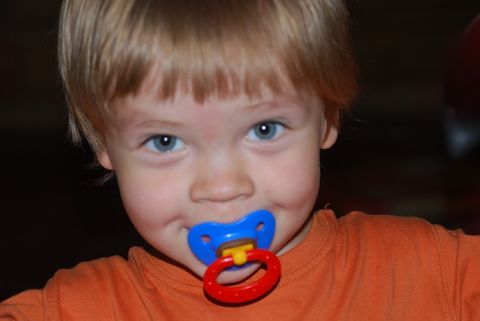New publications
Pacifiers are dangerous for boys
Last reviewed: 01.07.2025

All iLive content is medically reviewed or fact checked to ensure as much factual accuracy as possible.
We have strict sourcing guidelines and only link to reputable media sites, academic research institutions and, whenever possible, medically peer reviewed studies. Note that the numbers in parentheses ([1], [2], etc.) are clickable links to these studies.
If you feel that any of our content is inaccurate, out-of-date, or otherwise questionable, please select it and press Ctrl + Enter.

Pacifiers may cause delayed emotional development in boys.
This was stated by a team of psychologists from the University of Wisconsin-Madison. This study for the first time revealed the influence of pacifiers on the psychological development of babies.

Previously, pediatricians have expressed concern about the use of pacifiers. They came to the conclusion that pacifiers can harm a child's health, in particular, provoke dental problems and even ear infections.
People of all ages, even against their will, imitate the facial expressions or gestures of other people.
“This copying allows people to understand each other’s emotions. In particular, we can more easily perceive feelings of joy or, on the contrary, irritation and anger. This is just one of the ways in which we can interact, understand each other and communicate,” says Paula Niedenthal, a professor of psychology and the lead author of the study. “When we communicate with infants, we may talk to them, but at the initial stage, the child is more interested in our facial expressions and the tone of our voice. This is how young children learn to understand the meaning of words.”
According to the researchers, the pacifier prevents children from copying facial expressions and therefore the process of understanding is disrupted. The consequences of delayed emotional development remain for life. This only applies to boys; it does not affect the development of girls. Scientists find it difficult to answer why this happens. The reasons for such differences are yet to be determined.
Experts compared this effect to the effect of a Botox injection, which paralyzes the facial muscles and smooths out wrinkles. People who undergo this procedure involuntarily express fewer emotions than they could, and sometimes it is difficult to understand from the face what a person feels and what emotions he or she is experiencing.
"This study has opened our eyes, so to speak. Just imagine how hard it is for a child, who learns about the world mainly through facial expressions and sounds, to imitate and copy with a pacifier in his mouth," says the professor.
Scientists conducted an experiment in which students took part. Using a survey, experts recreated a picture of their childhood. Some men remembered very well that their parents did not try to wean them off the pacifier and they sucked on the pacifier longer than their peers.
The experiment involved making a decision based on another person's emotions. It turned out that men who sucked on pacifiers longer had a harder time "reading" other people's faces than others.
It is possible that girls who are not subject to such influences simply progress in emotional development faster than boys.
Experts do not claim that using a pacifier is an absolute evil. To get to the bottom of the truth, much more research needs to be done, but such a connection, it would seem, between a harmless pacifier and the development of a child still exists.

 [
[